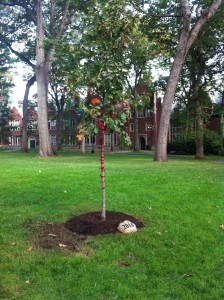The glorious fall weather was picture-perfect this past weekend, as I welcomed to campus Wellesley parents, grandparents, siblings, alumnae, and friends for Family and Friends Weekend and Homecoming.
 One of the highlights of the weekend, as always, was celebrating one of Wellesley’s oldest traditions: sophomore tree planting. On Saturday, more than 150 students and their families gathered on the Academic Quad to dedicate the Quercus Rubra, or Red Oak, that the Class of 2016 had chosen as their tree.
One of the highlights of the weekend, as always, was celebrating one of Wellesley’s oldest traditions: sophomore tree planting. On Saturday, more than 150 students and their families gathered on the Academic Quad to dedicate the Quercus Rubra, or Red Oak, that the Class of 2016 had chosen as their tree.
At the Wellesley Debates this past weekend, Paulina Perlin ’16, Prerana Nanda ’14, Simone Thibodeau ’14, and Mariya Getsova ’15 debated the topic “The structure of the higher education system in the United States is not consistent with democratic values,” while Sophia Mo ’14 moderated. As always, the students did an excellent job of presenting arguments for or against the motion. The before- and after-balloting indicated that those debating against the motion swayed the audience with their arguments.
For me, the weekend is also a wonderful show of our school pride during our many athletic contests. I was happy to cheer on the Blue as they took on Cedar Crest in soccer, winning 9-0. Congratulations also to the residents of Pomeroy, who had the most Superfans at that game.
Family and Friends weekend was enhanced this year by Pam Melroy’s wonderful talk on Saturday night: From Wellesley to the International Space Station. A Wellesley alumna (class of 1983), and an astronaut who has logged over 900 hours in space, Pam Melroy was only the second woman to command a space shuttle. I am grateful to Pam, who also is a Wellesley Trustee, for returning to Wellesley to speak to students and their families about her experiences. She is always enlightening and engaging and, despite her profession, very much down to earth.
My thanks go to all of the students, families, faculty, staff, and alumnae who made the weekend such a success.